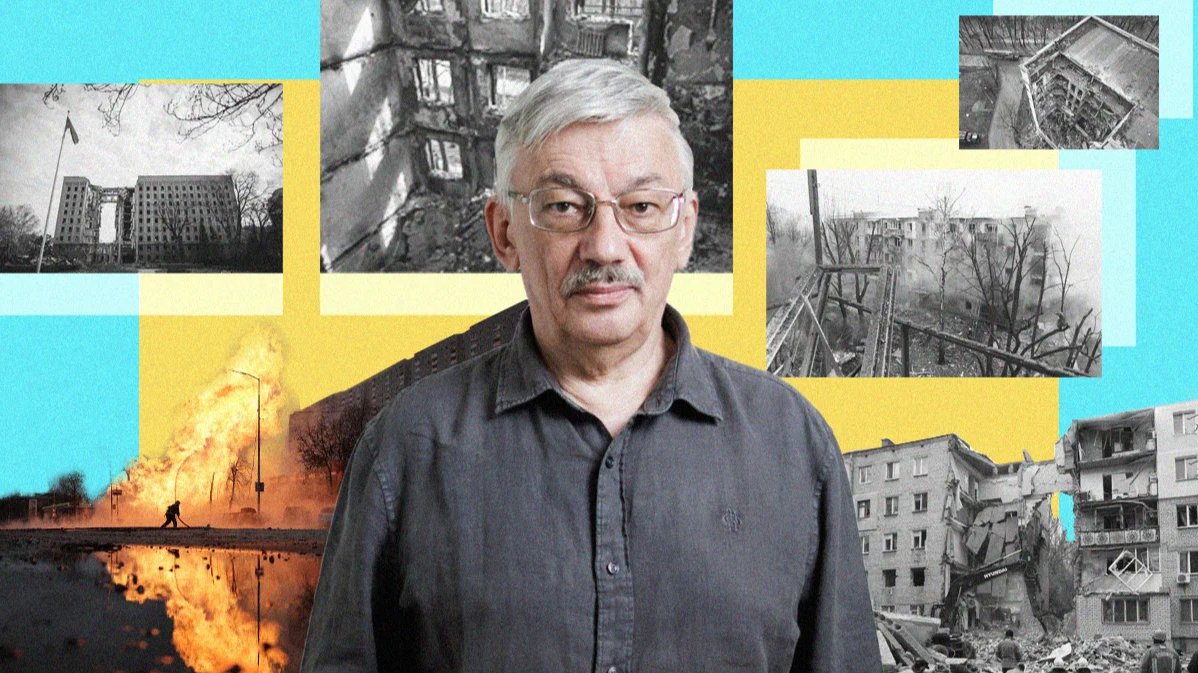Russian human rights activists visited Ukraine in January for the first time since the beginning of the full-scale invasion to document war crimes. Staff from Russian human rights organisation Memorial joined a team from Ukraine’s Kharkiv Human Rights Protection Group on a journey that took them to Kyiv, Kharkiv, Mykolayiv, Kherson and Poltava.
Memorial co-chairman Oleg Orlov, who led the Russian team just months after being released from a Russian prison himself, spoke to Novaya Gazeta Europe special correspondent Irina Kravtsova about the experience.
IK: You went to Ukraine as part of your human rights work shortly after being released in a prisoner exchange. Whose idea was this trip?
OO: I wanted to go to Ukraine immediately after the outbreak of full-scale war. A significant part of my career had already been spent focusing on hot spots in the former Soviet Union, when the bloodiest and largest war in the post-Soviet era broke out. Given the circumstances, it was, of course, important for me to go to Ukraine. Memorial’s many years of work aimed at promoting the value of life and preventing a return to totalitarianism failed to produce the results we had hoped for, to put it mildly. Russia has unleashed a terrible, brutal war. I knew I had to be in Ukraine — Memorial should be wherever such terrible acts are taking place.
IK: Both Ukrainian and international human rights activists have been working in Ukraine since the beginning of the war. What motivated you to join them as a Russian?
OO: To show that the gap that has opened between Ukrainian and Russian society can be bridged. When the 2022 Nobel Peace Prize was simultaneously awarded to Ukrainian and Russian human rights activists, it was met with very mixed emotions, not just by Ukrainian officials, but also by some parts of Ukrainian society.
We weren’t working alone in Ukraine — we worked alongside the Kharkiv Human Rights Protection Group. We have proven that we are united in our assessment of aggression, human rights, and humanitarian law violations. Among other things, I think it was an important step towards repairing the future relations between the Russian and Ukrainian people.
I fully understand those in Ukraine who told us that they would never forgive Russia for its crimes.
At the same time, I fully understand those in Ukraine who told us that they would never forgive Russia for its crimes, that they would never accept that criminals had gone unpunished. Still, the same people often added that we were not their enemies. It meant a lot to hear this from people who have suffered terribly at the hands of Russian troops, and it happened after we explained to people that we understood them, that we were united in the belief that Russian criminals must be punished, and that we couldn’t be more convinced of that. I think all these conversations are extremely important for the future.
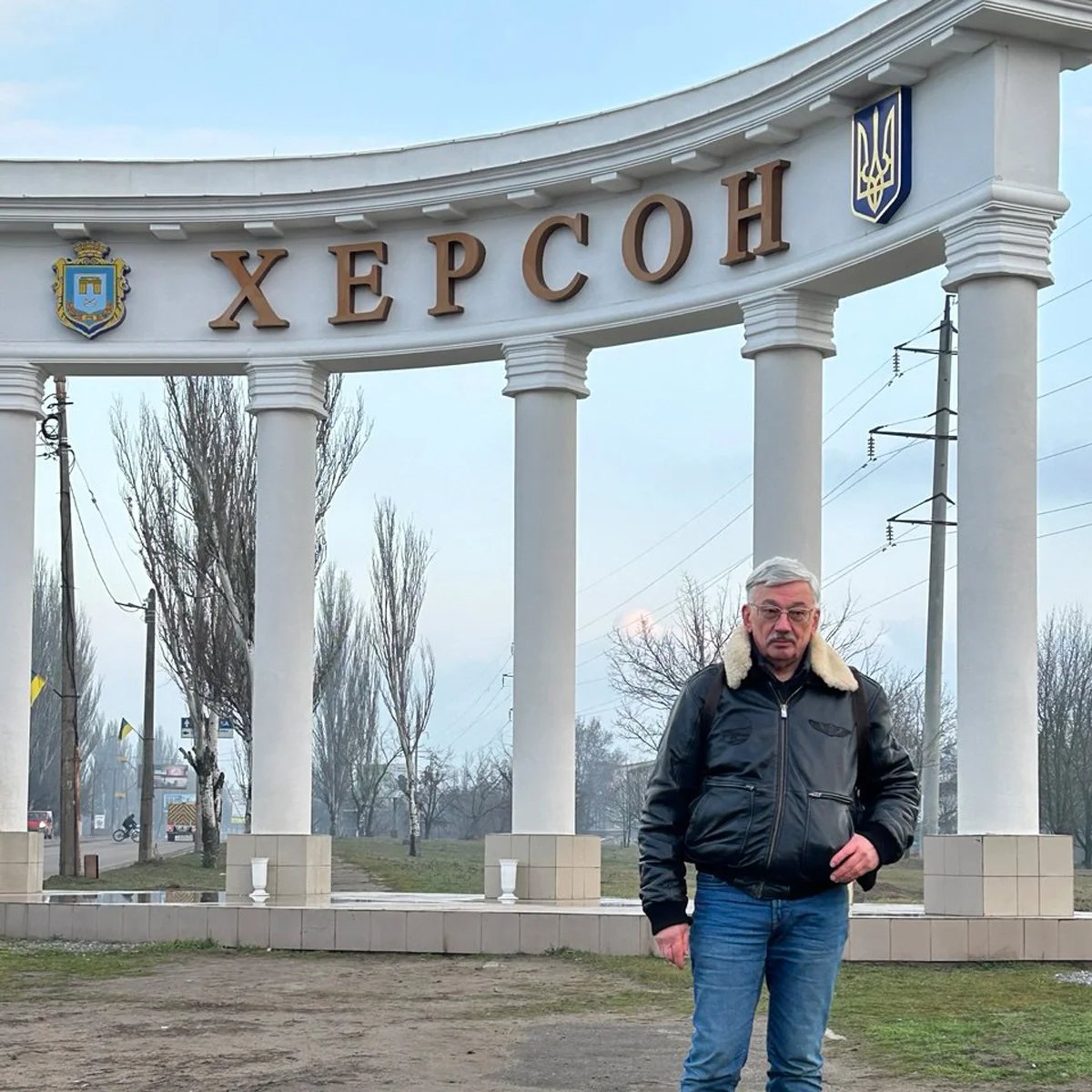
Oleg Orlov at the entrance to the city of Kherson, Ukraine. Photo provided by Oleg Orlov
IK: At a press conference in Berlin in which you discussed your trip to Ukraine, you said that your aim was to document new war crimes. Did you manage to do that?
OO: Yes, we visited villages where human rights activists had not had enough time to interview victims. Due to the scale of the Russian aggression, there are still many of their victims in Ukraine who are yet to be documented, including those who were abducted, illegally imprisoned, and victims of torture, as well as the relatives of those who were executed.
IK: What was your contribution to this work as Russian human rights activists?
OO: As Memorial staff documented the violations of international law and war crimes committed by the Russian army during the First and Second Chechen Wars, an entire system of state terror was established and executed before our eyes.
The crimes committed by the Russian army in Ukraine were not isolated instances. … We see a system in place that was fine-tuned during the Chechen wars.
So for us, the crimes committed by the Russian army in Ukraine were not isolated instances, but a deliberate violation of international law. We see a system in place that was fine-tuned during the Chechen wars. This contextual knowledge helps us document what is happening in Ukraine now in our post-trip report.
It’s important to understand any phenomenon and to realise what is happening if we are to deal with things as they really are and draw useful conclusions. Without this understanding, which I believe it is important for us to contribute to, the same thing will happen over and over again in different parts of the world.
IK: How was the trip arranged?
OO: We travelled through many parts of Ukraine: we were in the cities of Kyiv and Kharkiv and the surrounding regions, in Poltava, in the Chernihiv region, and also in the south — in Mykolayiv, the city of Kherson and its surrounding region.
Together with the Kharkiv Human Rights Group, we held events for victims. For our Ukrainian colleagues, the purpose of these is primarily to find victims, record crimes, initiate criminal proceedings and an investigation, and provide financial compensation to the victims. In fact, Memorial allocated half of the prize money it received from the Nobel Peace Prize in 2022 to supporting Russian political prisoners, and the other half to Ukrainians who were victims of Russian aggression.
For us, as Russian human rights activists, it was also important to hear the stories of the victims with our own ears.
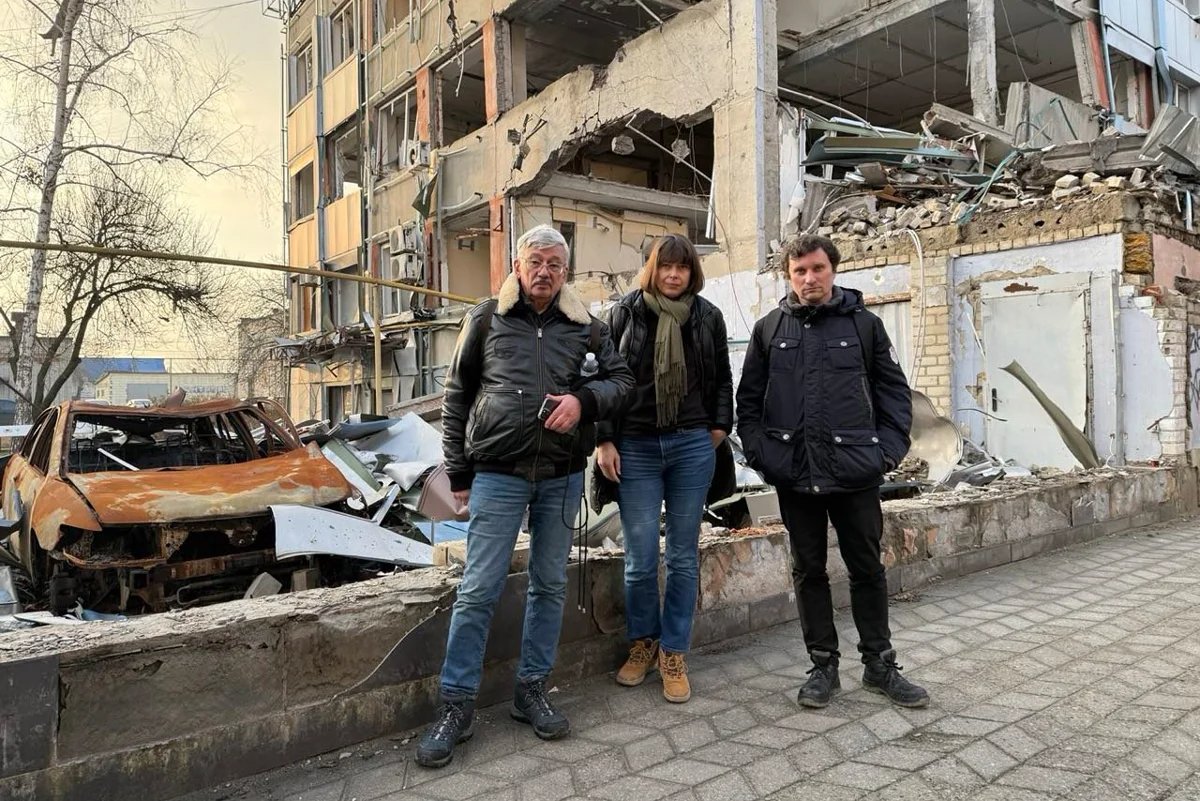
Oleg Orlov with his Memorial colleagues Natalya Morozova and Vladimir Malykhin in Kherson. Photo provided by Oleg Orlov
IK: How did the victims react to being interviewed by a Russian human rights activist?
OO: Sometimes my Ukrainian colleagues and I interviewed victims together. On other days, there were so many people that the Kharkiv Human Rights Group and Memorial divided up the workload: they interviewed victims in one room, and we interviewed them in another.
Before we started talking, our Ukrainian colleagues made all the victims aware that we, Russian human rights activists, were working with them today. Of course, sometimes people’s eyes widened in shock, they were amazed. We explained that yes, we are Russians, but we are against the war. We not only condemn the crimes of the Putin regime, but are actively fighting against them. I said, “I’ve also recently been in a Russian prison for this”. Sometimes I was asked what exactly I had been in prison for. When I told them, they agreed to talk. We only had two refusals while trying to arrange a meeting over the phone.
IK: Do you speak Ukrainian?
OO: I don’t speak Ukrainian, which made it very difficult for me at the beginning. When my Russian colleagues and I went to Ukraine, we were most afraid that people would refuse to even listen to us because we speak Russian. But this never happened and often, after listening to our questions, people replied in Ukrainian. They explained to us: “I can speak Russian very well, but I don’t want to. I will only speak Ukrainian.” That’s their right. We showed empathy and respect for them, and they almost always showed respect in return.
At first, a Ukrainian colleague sat with us and helped translate, but then I got used to it and began to understand Ukrainian myself, although I still answered people in Russian. Language, by and large, was not a hindrance. Many Ukrainians for whom Ukrainian is their native language also switched to Russian when speaking to us.
We asked people if we could record them. In the vast majority of cases, people replied: “Yes, of course, what is there to hide?” And then we just translated from Ukrainian into Russian. Fortunately, there is now software that simplifies this process.
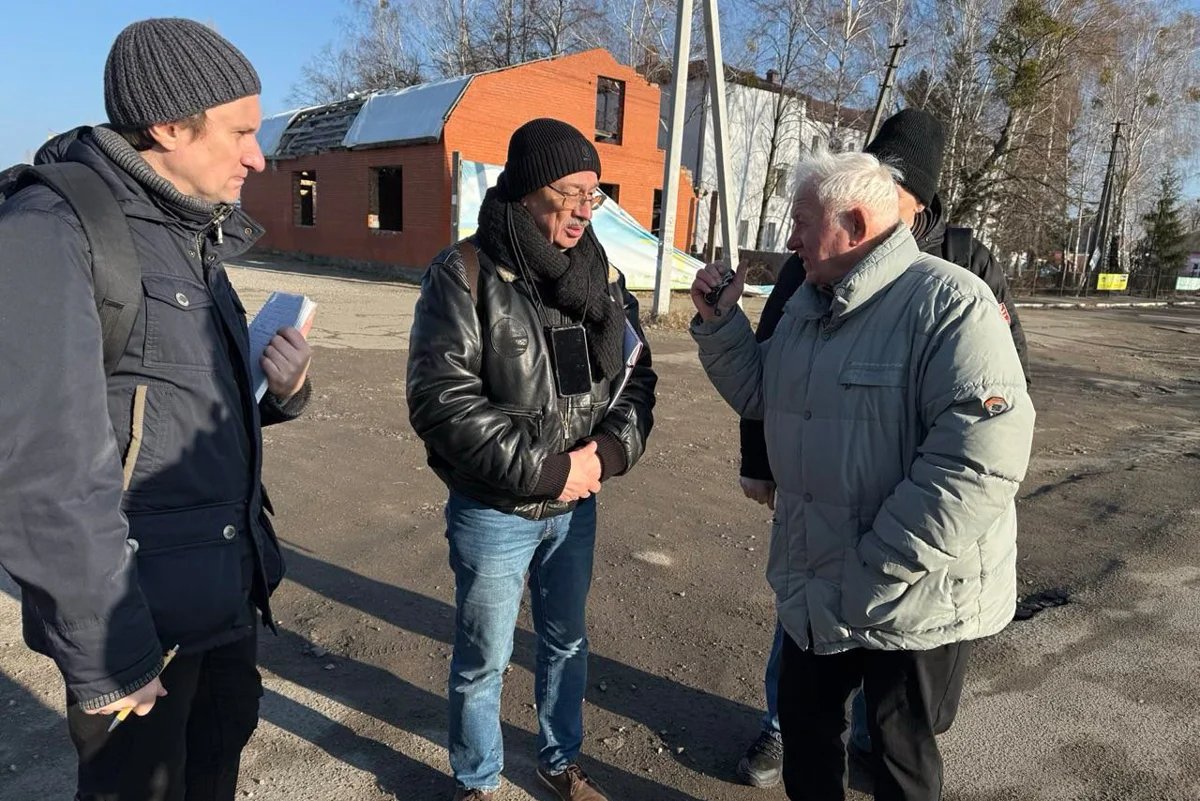
Oleg Orlov speaks to a local in a village near Bucha, Ukraine. Photo provided by Oleg Orlov
IK: Did any of the accounts you heard strike you in particular?
OO: It’s quite difficult to surprise me — I’ve seen and heard a lot — but I was surprised by some of the stories the prisoners of war had to tell us. Their stories about their deliberately terrible treatment were shocking.
When a sadist acts on their own, that’s one thing. But this is a well-established system which creates torturous conditions for POWs. It is a particularly sophisticated and cruel system, especially in the depths of Russia, where prisoners are transferred after initially being held in POW camps near the front, guarded by people embittered by the war.
People sit in a cell. From there, they are regularly taken for interrogation, and subjected to terrible torture to force them to incriminate themselves or others and “confess” to crimes against civilians. In reality, the torture is constant, as the torture continues within the cell.
This systemic atrocity directed against thousands of prisoners of war surprised me. I can’t rationally explain it.
Everything may look fine in the cell: 10 people sharing five bunk beds, so everyone has a bed, and there is a toilet, water, and a bench. But they can’t sit and have to stand from 6am until lights out at 10pm. They are not even allowed to walk around the cell. Even though there are taps, they are not allowed to drink water. Even though the toilet is literally in the cell, they cannot go to the toilet. You can only drink and go to the bathroom when you’re allowed, in five-minute intervals. If someone breaks the rules, everyone in the cell is beaten.
Every morning, everyone is taken into the corridor while their rooms are checked. And every morning, they are brutally beaten. They use stun guns, batons, and sometimes wooden hammers. It’s not for some specific violation of the rules. It just happens every morning. This systemic atrocity directed against thousands of prisoners of war surprised me. I can’t rationally explain it. You’d think it would be beneficial to have normal conditions in detention so that more Ukrainian soldiers would surrender, and that they’d take into consideration the thousands of Russian POWs in Ukraine, but, no, for some reason, they chose to carry out state terror in this case too.
IK: Was there a personal story that particularly moved you?
OO: One day we went to a village that human rights activists had not been to before. On its outskirts there was a defunct farm in which the occupiers had set up a sort of filtration centre [places where Ukrainians attempting to leave the occupied territories via Russia are subjected to ruthless security checks]. They took people there, tortured them, beat them, interrogated them and forced them to testify. Some were released, some were killed, some had criminal cases opened against them and were sent to Russia for trial.
By the way, the same thing happened during the Chechen wars — people talked about the horror they had experienced, about how people were kidnapped there, how they found the bodies of their relatives only after the occupiers had left.
And so we went to the village administration and started talking to the woman in charge. It turned out that her husband had been kidnapped and tortured by the Russian occupiers. She didn’t know what had happened to him for a long time, and when the occupiers left, her husband’s body was found on the outskirts of the village, buried in a shallow grave, showing signs of terrible torture.
I honestly thought that this woman would refuse to talk to us. You could tell it was hard for her. Nevertheless, she spoke to us in Ukrainian, telling us everything in detail. At the end she said: “There is and can be no forgiveness for this. We will never forgive it, but you are not our enemies.” I was shocked that a person who had been through such a thing still found the strength to say that not all Russian people are enemies for her now.
IK: Russian Children’s Rights Commissioner Maria Lvova-Belova said in 2023 that Russian authorities had removed more than 700,000 children from occupied Ukrainian territories. Since then, only scattered data appeared about children who were brought back to Ukraine. Have you been able to find out any more about that?
OO: There are no clear figures on children and civilians in general who have been taken to Russia. I know that some children are gradually being returned to Ukraine when authorities find relatives ready to take them back. There are mechanisms for that on both sides, people are working on it, and the process is underway. Similar mechanisms are applied to prisoners of war.
But what isn’t happening at all is the release of civilians who have been taken from Ukrainian territory — first of all, those who were illegally detained and arrested.
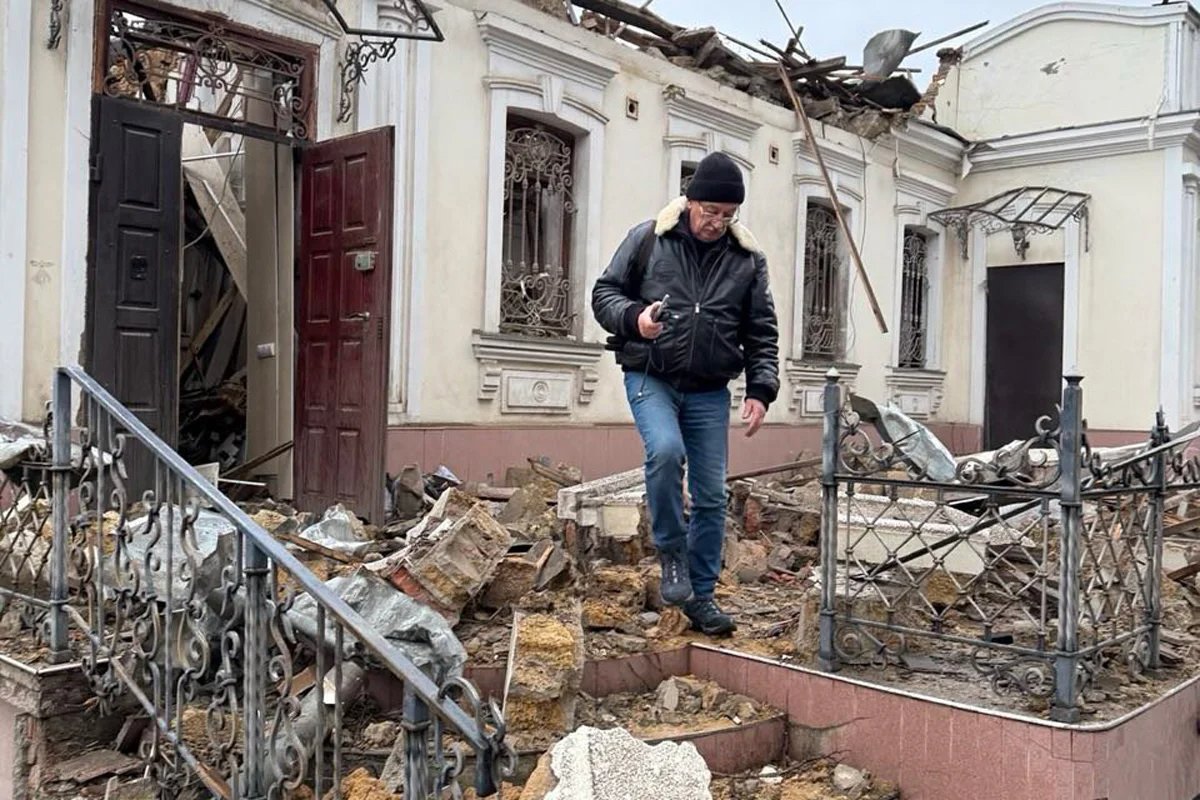
Oleg Orlov in Kherson, Ukraine. Photo provided by Oleg Orlov
IK: How many people are we talking about?
OO: There are no exact figures. The Ukrainian authorities say that about 16,000 missing Ukrainian civilians may be on Russian territory. But we don’t know how many of them are alive.
More specifically, we know of about 1,600 Ukrainian civilians who have been detained on Russian-controlled territory — down to what detention centres they were held in. These people are mainly kept incommunicado, and the problem isn’t being addressed at all. They are not being exchanged because there is no mechanism for exchanging civilians. No negotiations are being held to bring about their return.
People were taken to Russia and then just disappeared.
This is one of the most tragic stories of this war. Ukraine is offering to exchange those civilians for those who have been convicted by Ukraine for collaborating with Russian occupation authorities. But Russia doesn’t seem interested in this, that’s the problem. Ukraine keeps lists of such people, their names and places of detention are known. But on the Russian side, they are in some kind of black box. People were taken to Russia and then just disappeared.
IK: What kind of people are they?
OO: These are people who were detained in the occupied territories, for resisting the Russian occupation, for going out to protest. In the first months of the occupation, there were TV reports about people who went to the central squares of their occupied cities carrying Ukrainian flags. And then these people disappeared. They were detained, placed in illegal detention centres, and their fate is now unknown.
People were also detained at so-called filtration centres when they left occupied Mariupol, for example. People had to save themselves: some went to Ukraine, others to Russia, depending on where there was a way out.
Some men were detained simply for having camouflage clothes in their homes.
Those who went to Russia had their phones checked, and if the security services found anything they didn’t like, they were detained. We don’t know what happened to them after that.
The occupiers also went door to door. Some people were detained for fighting in eastern Ukraine before the full-scale invasion, even those who had long since been demobilised. Some of them disappeared without a trace. They detained activists from Ukrainian nationalist or national organisations, or regular people for completely unknown reasons — some men were detained simply for having camouflage clothes in their homes … All this happened in Chechnya in much the same way.
IK: Were people who disappeared like this in Chechnya ever found?
OO: There are more than 3,000 names in the Memorial database of people who disappeared without a trace — and those are only the ones we’ve managed to confirm were detained and taken away. In fact, there are over 5,000 such people, but information about them is scarce. In a minority of cases, bodies were eventually found, as in Ukraine, bearing signs of torture and violent death. The rest have not been found.
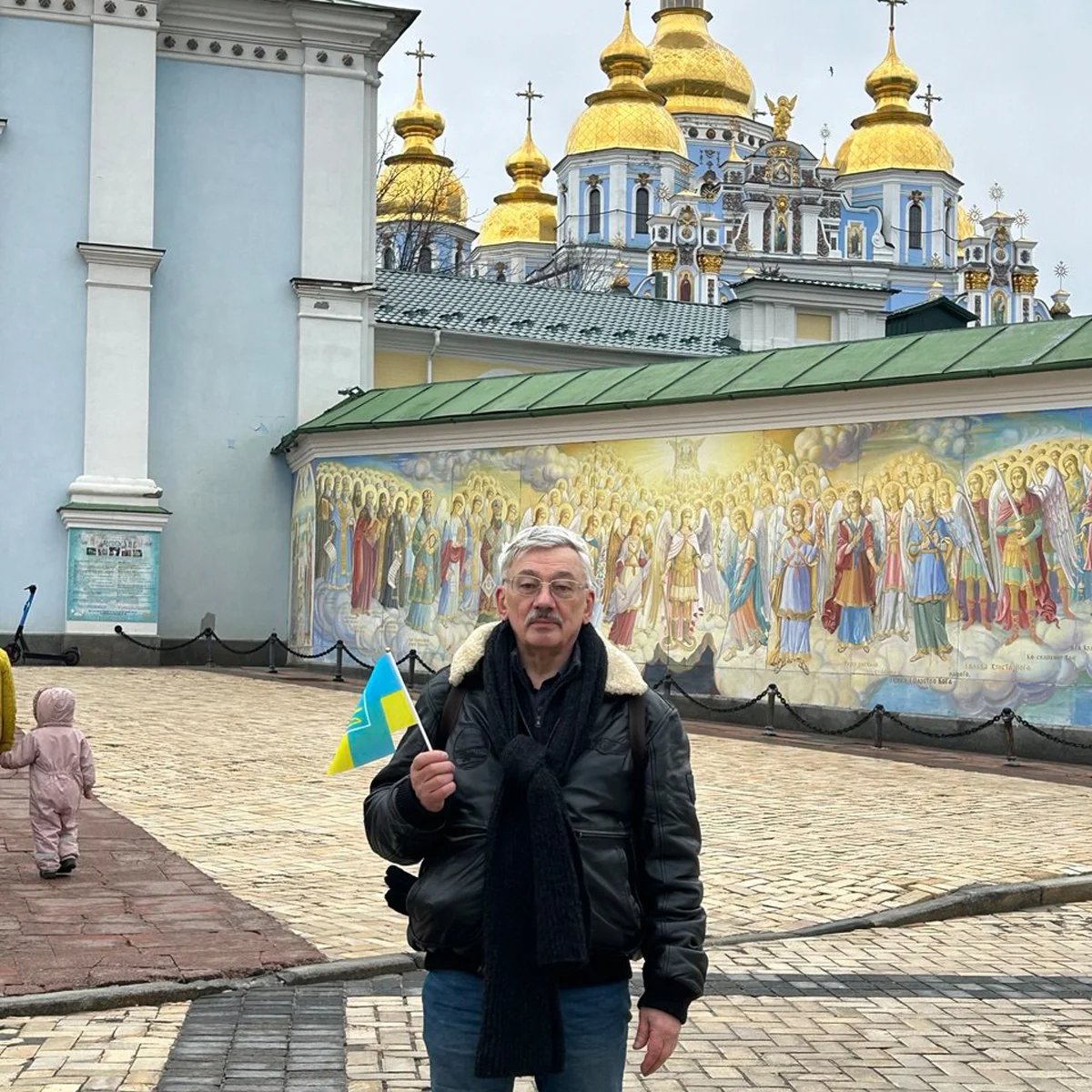
Oleg Orlov in Kyiv, Ukraine. Photo from personal archive
IK: Some people now feel apathetic in the face of Trump’s talks with Putin and Zelensky that the justice they had been waiting for may not be forthcoming. There is now no hope of Putin going to The Hague anytime soon, and reparations to Ukraine seem out of the question. Do you worry that things could end very badly?
OO: Could it end badly? Yes. It will have very sad consequences for the whole world — that the aggressor got the prize he wanted, that he’s been appeased. He was told: we’ll meet you halfway precisely because you are waging such a bloody war, and we need to stop it. For the sake of stopping the war, we will not punish you in any way — we’ll reward you, in fact. But there will be immediate peace.
Yes, so that seems to be what’s going to happen. It means that there will be a short-lived, fragile peace. In the future, Russia, as well as other aggressors, will think that this is the way to do business, and inevitably, Putin’s regime will start more wars in Europe or along Russia’s other borders.
IK: And how do you feel about the coming world order?
OO: I don’t like it, but will I stay awake all night or cry myself to sleep? No. … I don’t believe in God, but I like this one prayer: God, grant me the serenity to accept the things I cannot change, the courage to change the things I can, and the wisdom to know the difference.
My work in Ukraine is an attempt to make a difference.
My work in Ukraine is an attempt to make a difference. My protesting in Moscow and my time in prison for it is the impact I can have. Each person should attempt to influence events as much as they can and have the strength to do so wherever possible. Though I can’t have a global impact on my own, I can do my part.
If the worst comes to pass and the aggressor is rewarded — which could happen — I will have to accept it. It’ll be a different world to the one I’d hoped for, a world different to what it was before. A horrible, scary new world that I’ll have to live in, adapt to, and find ways to influence again. That’s my philosophy and how I’m going to live my life.
Join us in rebuilding Novaya Gazeta Europe
The Russian government has banned independent media. We were forced to leave our country in order to keep doing our job, telling our readers about what is going on Russia, Ukraine and Europe.
We will continue fighting against warfare and dictatorship. We believe that freedom of speech is the most efficient antidote against tyranny. Support us financially to help us fight for peace and freedom.
By clicking the Support button, you agree to the processing of your personal data.
To cancel a regular donation, please write to [email protected]
